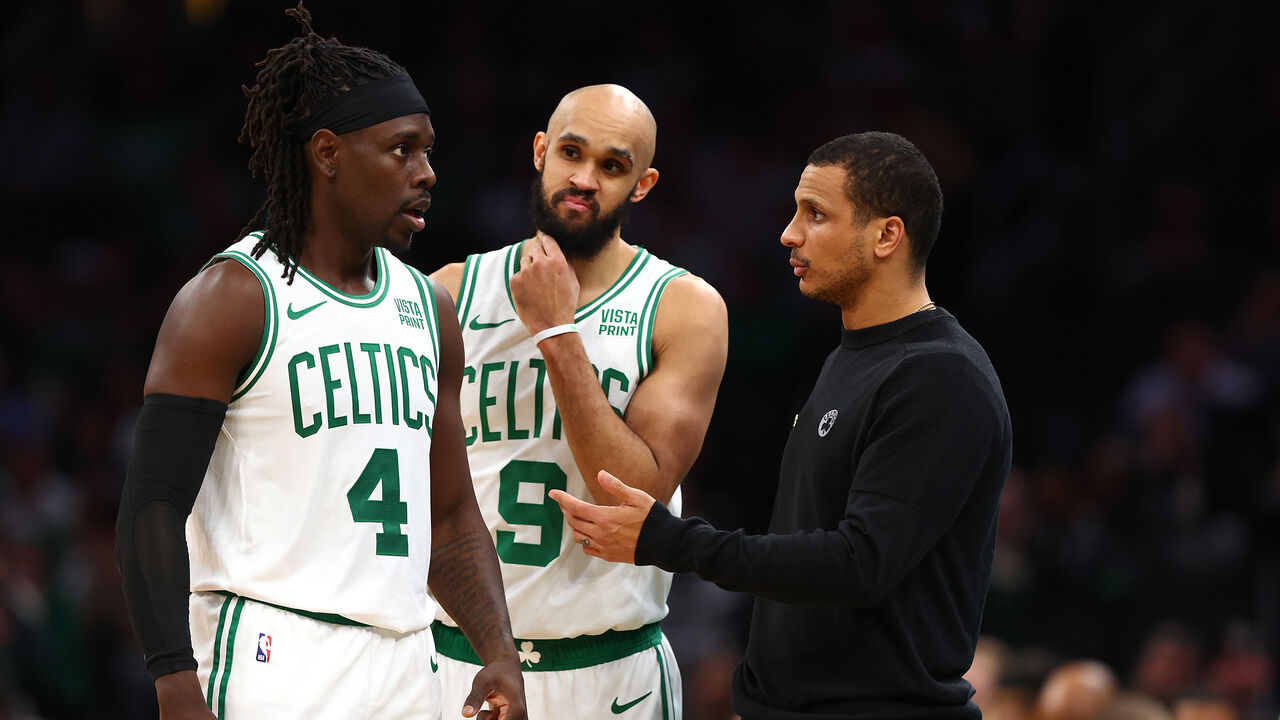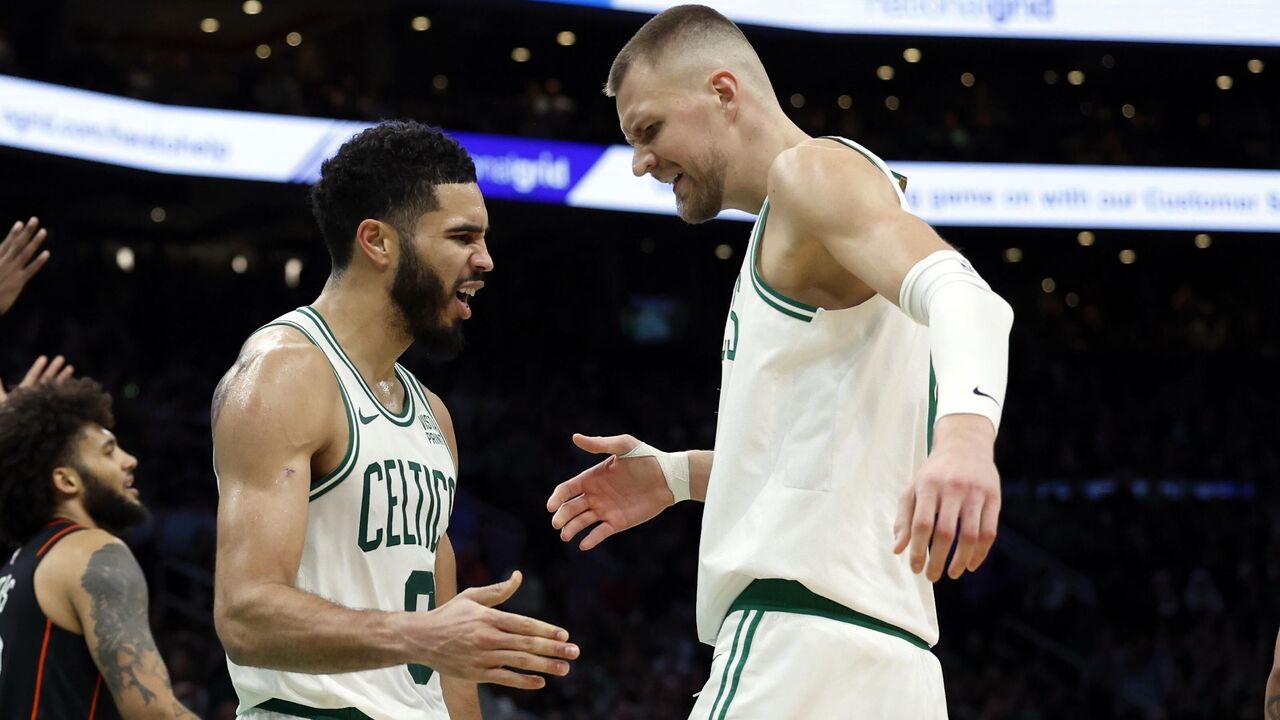Celtics could be historically great, but still room for doubt
A blown 22-point fourth-quarter lead has a way of leaving a bitter taste in one's mouth, no matter how savory the course that preceded it.
In the case of the Boston Celtics, what preceded it was three-quarters of a season for the ages, and, more recently, the most emphatic 11-game win streak in NBA history. Tuesday night's collapse against the Dean Wade brigade in Cleveland didn't tell us anything new about this team, but it did seem to pick at some festering doubts, starting a familiar take-and-countertake cycle anew.
So with that game in the rearview mirror, and a potential palate cleanser against the defending champion Nuggets on tap, let's take stock of where the Celtics are at, what makes them so good, and why people still have a hard time trusting them.
We can start with the facts: the Celtics have led the Eastern Conference for all but one week this season (shout out to the November Sixers), and they're on pace to win 65 games. They currently have an eight-game cushion for the East's No. 1 seed, and a 5.5-game lead for the top record in the NBA overall. And their underlying numbers are somehow even more impressive than that, painting a picture of a team that's not just great but potentially historic.
They've outscored opponents by 11.4 points per 100 possessions, the fourth-best mark in NBA history behind only the 1995-96 and 1996-97 Bulls and the 2016-17 Warriors, per Basketball-Reference. Only 12 other teams have even cracked double-digits in net rating over a full season, and eight of those teams went on to win the championship. (One of the other four lost to another team on that list.)
Boston also owns the highest offensive rating in history, which partly speaks to this era of inflated offense - last year's Kings set the previous record, for context - but not entirely. Relative to league average, the Celtics' offense still ranks as the 16th-best unit all time, and the best since Golden State's 73-win outfit in 2015-16. That alone wouldn't make them historically great, seeing as only four of the 15 teams above them in relative offensive efficiency won titles (three being Jordan-era Bulls teams). But the Celtics happen to pair that offense with the league's second-ranked defense, which is probably an even more reliable entity.
At that end, Boston simply doesn't face the kind of difficult coverage questions that basically every other defense has to wrestle with. Even the top-ranked Timberwolves defense has to scheme around the limitations of Karl-Anthony Towns and, to a lesser extent, Mike Conley. The third-ranked Cavaliers need to insulate their small backcourt, and they have some question marks on the wing. The always innovative Heat tie themselves into pretzels to protect Tyler Herro.
The Celtics, comparatively, have no real weak spots to prod at. They can switch into virtually any matchup and feel secure enough not to consider it an emergency. Heck, they spend chunks of almost every game using nominal point guard Jrue Holiday as the primary defender of the opposing team's center. If that's a matchup they're deliberately starting possessions with, it's hard to find a "mismatch" that can truly trouble them.

As a result, no team is better at staying out of rotation. (If the Celtics do put two on the ball and put themselves in scramble mode, it's usually the result of a calculated choice rather than one the opponent has forced them into.) As a result, they surrender the league's fifth-lowest rate of corner threes, foul less frequently than any team, and induce more isolation possessions than all but three defenses. With Kristaps Porzingis able to stay out of ball-screen action and camp out in the lane, they also rank third in suppressing opponent rim shots.
Thanks to the strength and versatility of Holiday, the point-of-attack stickiness of Derrick White and Jaylen Brown (which frees Holiday to function as a roving big man defensively), the length and help-and-recover instincts of Jayson Tatum, and the enormity and agility of Porzingis as the last line of defense, Boston can cross-match and toggle assignments like no other team. And the rub is that opposing teams can't do the same at the other end of the floor.
If those opponents want to avoid having their best rim-protector yanked out to the perimeter by the shooting gravity of Porzingis, the most viable place to stash that guy is on Holiday, the Celtics' lowest-usage starter. The problem with that is Holiday's still a very capable creator who's shooting 45% from 3-point range this season. Last week, the Warriors tried to throw a curveball by making Brown their designated help point, and that went about as well as you'd expect.
Even though Tatum is clearly Boston's best player and biggest offensive pressure point, there's no easy answer for where a defense should direct its attention. Because they have so much shooting and so much shot creation, the Celtics can put together any number of two- and three-man partnerships for their various pick-and-roll, dribble-handoff, and split actions. That also owes to their primary scorers' willingness to set screens, Tatum in particular. His actions with White are especially deadly no matter who's handling and who's screening.
Opponents are reluctant to switch White's defender onto Tatum, so they'll often put two on the ball and let White slip free out of inverted actions. When Tatum screens and pops, the screen defender won't linger in the lane and risk giving him an open above-the-break three, which means White can often stroll into the lane unimpeded. Off-ball screens, especially flares from Tatum for a curling White, have much the same effect.
Brown's developed great synergy with Porzingis, particularly when they run empty-side DHOs or when Porzingis slips out of weak-side pindowns. White and Porzingis run a mean two-man game as well. In fact, Porzingis has formed effective pick-and-roll combinations with almost everyone, because all of Boston's other starters are killer pull-up jump shooters and Porzingis is a serious pick-and-pop threat.
The most sensible way to neutralize those actions is to switch, but defenses that do so risk getting smoked by Porzingis either slipping to the basket or posting a mismatch on the back side. The big man leads the league in scoring efficiency on post-ups, at a ridiculous 1.37 points per possession. Porzingis has also improved as a playmaker, so the Celtics feel comfortable running stuff through him at the elbow, with everyone else cutting and screening off of him.

So why does it feel like this team lacks the gravitas of an all-time juggernaut, even though every statistical indicator suggests they are one? Why do they still seem to engender so much doubt?
There are a few explanations, for which there are varying degrees of validity. One is the simple fact that this iteration of the Celtics hasn't won a championship, and people tend to have a hard time imagining the future as anything but an extension of the present. There are also real scars from recent postseason letdowns (especially against Miami) in which Boston looked like the better team on paper.
Then there's the fact Tatum isn't a consensus top-five player in the league, which means the Celtics may find themselves in a scenario (or multiple scenarios) in which they don't have the best player in a playoff series. There are questions about whether Brown's shaky handle and vision will become liabilities against the best defenses. Holiday has a habit of disappearing offensively in the playoffs, clanking his way to 48% true shooting in three postseasons with the Bucks. And beyond the vaunted starters, Boston's bench feels a bit precarious; the only reserves likely to see real playoff rotation minutes are the 38-year-old Al Horford, 6-foot-1 Payton Pritchard, and untested Sam Hauser.
There are also stylistic concerns, namely that the Celtics are jumper-dependent and don't get to the rim a ton, which leaves them vulnerable to variance that could swing the wrong way at the wrong time. Though they have multiple solid playmakers, they lack one elite individual passer, which can contribute to some stodgy and predictable tendencies. That manifests most glaringly in their late-game offense, which tends to slow to a crawl as ball and player movement dries up.
Again, there's at least a sliver of merit to all of those concerns, but Boston's answered most of them as comprehensively as they possibly can until the playoffs give them the chance to prove this year is different. Sure, Tatum has some blemishes on his postseason resume, but critics tend to fixate on a couple of tough series (one against Miami in the bubble, another in the Finals against an exceptional Warriors defense) and ignore the triumphs, including the fact he set the record for Game 7 scoring to eliminate the rival Sixers nine months ago. Brown's an improved playmaker, and a Holiday dropoff feels less likely (and wouldn't hurt as badly) given his scaled-down offensive role.
The Celtics rank 27th in rim frequency and dead last in overall paint-shot frequency, but they're one of the best teams in the league at converting from those zones because of the space they create. Porzingis has also given them an interior dimension that's different from previous seasons, including nudging their free-throw attempt rate up to league average.
As for the crunch-time bug: though it did bite them Tuesday, when they scored seven points in the last six minutes against the Cavs, it hasn't been an issue on the whole. It tends to stand out because it's the only way the Celtics lose (they've lost only four games all season that didn't include clutch time), but their offensive process in those scenarios isn't much different from any other contender's, with the exception of Denver's. Boston ranks fifth in the league in crunch-time offense, and fifth in crunch-time net rating, per NBA Advanced Stats. Even their assist rate ranks 10th in the clutch, compared to 22nd overall.
For now, because of all the aforementioned nitpicks and the lack of precedent, we can still go on treating this season as a wide-open race. That's fair, given Milwaukee's championship pedigree, Miami's recent penchant for giant-slaying, the upside of the fully healthy Sixers and Knicks, and the bevy of dangerous teams in the West, including the defending champs and their indomitable two-time MVP. But if the Celtics do wind up ripping through the East en route to hoisting the Larry O'Brien Trophy, as the numbers suggest they should, it could wind up being one of those title runs that feels inevitable in hindsight.